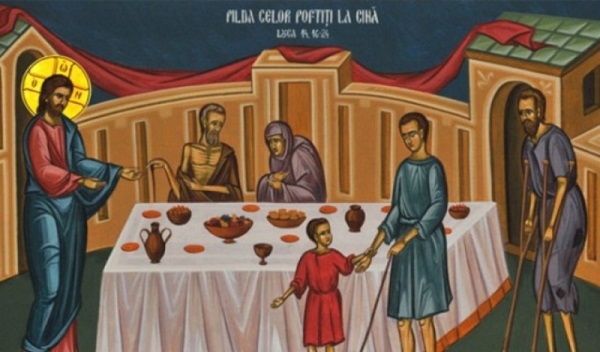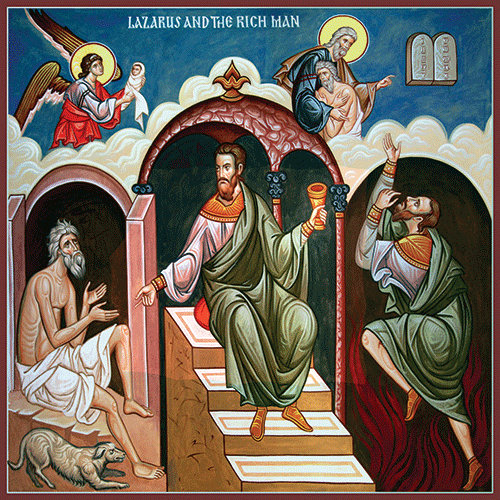Third Sunday after Trinity
Now the tax collectors and “sinners” were
all gathering around to hear him. But the Pharisees and the teachers of the law
muttered, “This man welcomes sinners and eats with them.” Then Jesus told them
this parable. “Suppose one of you has a hundred sheep and loses one of them.
Does he not leave the ninety-nine in the open country and go after the lost
sheep until he finds it? And when he finds it, he joyfully puts it on his shoulders
and goes home. Then he calls his friends and neighbors together and says, ‘Rejoice
with me; I have found my lost sheep.’ I tell you that in the same way there
will be more rejoicing in heaven over one sinner who repents than over ninety-nine
who do not need to repent” (Luke 15:1-10).
The parables recorded in chapter 15 of
Luke’s gospel are the heart of his account. They are the parables about finding
lost things. The momentum of the book builds from here to Jesus’ declaration in
chapter 19: The Son of Man came to seek and to save what was lost. Jesus
is the shepherd who “repents” His lost sheep – He seeks them out and brings
them back. Jesus is the woman who searches for and finds the lost coin. Jesus
is the father of the lost son who brings him back from the dead and into the
banquet. (Prange 1988) Jesus uses these three
parables to identify Himself as God. He is the Good Shepherd. His sheep hear
His voice and follow Him. He is the one, like the shepherd, the woman, and the father
in the parable, who has come to seek and to save the lost. (Bailey 2014)
The parable of the lost sheep is a
continuation of the good shepherd tradition, which goes back to Psalm 23, and appears
throughout the writings of the prophets. (Bailey 2014) Physically, the shepherd
is bringing back the sheep. Theologically, God is bringing back the sinner,
causing him to repent. (Bailey 2014) As the shepherd
searches, he calls the sheep. The sheep will recognize his shepherd’s unique voice
and call. The sheep responds by calling back, by bleating; he also does not
resist his master. The lost sheep accepts being found. (Bailey 2014) In this respect, the
parable breaks down somewhat. We know from scripture that we have no capacity
to aid in the search, as we are dead in our trespasses and sins. We are also,
in our natural state, inclined toward evil and away from good. Until we are brought
back, we have a bound will that always chooses, and delights in, evil.
Modern Bible translations often
abstract the good shepherd imagery. The imagery of the shepherd was inspired by
the Holy Spirit in the writers of the Bible because it is a real thing that people
within the middle eastern culture were familiar with. Shepherds really do have
to go after their lost sheep if they don’t want them to die; lost sheep hide
themselves and bleat out of fear, rather than try and find their way back to the
safety of the heard. If the shepherd doesn’t act quickly, time, exposure to the
elements, or wild animals will kill the sheep. (Bailey 2014)
Repentance is not a work that man does.
It is done to man by God. The Lord,
Yahweh, my Good Shepherd, restores my soul.[1]
He “repents me”, or turns me back, or converts my soul. (Bailey 2014) The word used in Psalm 23:3 that the NIV
translates “restores” is the Hebrew word “shuv”. It means to return, or
to repent. Properly translated in this context it would read, “He brings me
back,” or “He causes me to repent.” (Bailey 2014)
Again, Jesus goes against the teaching of the ancient rabbis who taught that a
righteous man shouldn’t associate with a sinner, even to bring him to
repentance. The Pharisees, the shepherds of Israel, should be seeking out these
lost sheep. Jesus tells them these three related parables to illustrate His
point. He reiterates to them what He said while eating with Levi the tax
collector: I have not come to call the righteous, but sinners to repentance.[2]
(Prange 1988)
Sheep are helpless and need constant
attention; they are not capable of doing the things needed to take care of
themselves. When they wander from the fold, they are unable to find their way
back or to survive in the wilderness. They need the shepherd to come find and
rescue them. We all like sheep, says Isaiah, have gone astray.[3]
We require our Good Shepherd to rescue us, or we too will die, in the wilderness
of sin, separated from God’s fold. The lost sheep is a small percentage of the
flock, but still worth finding. How much more valuable to God are people? (Bailey 2014) We are so valuable
that He sent His Son into the flesh to bear our sin, and be our savior, that
everyone who believes in Him may have eternal life.
Jesus’ summary statement that there
will be more rejoicing in heaven over one sinner who repents than over
ninety-nine righteous person who do not need to repent may seem strange. It isn’t,
however, that Jesus is saying there are people who don’t need to repent. The
message of Christ and the apostles is, after all, “Repent, and believe the
gospel.” This is a criticism of the self-righteous Pharisees who thought they
were perfect and did not need to repent. (Prange 1988) Repentance is
recognizing our sins and turning to God in faith, trusting in His mercy. It has
two parts: contrition, or sorrow for your sins, and faith, or
believing the message of the Gospel. That Gospel message is that our sins are forgiven
for the sake of Christ, who died as the propitiation for the sins of the whole world,
and who rose from the dead for our justification; in Him we have eternal life. (McCain 2005)
The present life of the Christian is one
of constant repentance as we struggle daily against our sinful nature that
delights in sin. Our good works, which show our repentance and faith, are not part
of our repentance. We don’t do good things to show how much we are repenting.
Rather, after we repent, we begin doing good things. (McCain 2005) The Roman Church’s
teaching about repentance is what sparked the Reformation. Luther was angered
by Rome’s practice of selling Indulgences – that a person could buy the forgiveness
of sins with money. This practice was directly contrary to God’s Word, which
says we are saved from sin and death by the grace of God through faith in
Christ. (McCain 2005)
The forgiveness of sins comes through
faith in Christ. Confessional Lutherans condemn those who say that we must do
works of satisfaction to earn forgiveness, or cancel some punishment we deserve
because of our sins. Jesus is the lamb of God who takes away the sin of the
world. He is the once for all sacrifice for sin. (McCain 2005)
Since faith is a gift from God, how do we receive it? Faith comes through
hearing, and hearing through the message of Christ. God the Holy Spirit works
through the word of God to create faith in men’s hearts. Faith is no mere
intellectual decision; it is the undeserved present created in us by the Holy
Spirit, who uses the tools of word and sacrament to do His work. This is how Christ,
our Good Shepherd, seeks His lost sheep and brings them back.
Bibliography
Bailey, Kenneth E. The Good Shepherd: A
Thousand-Year Journey from Psalm 23 to the New Testament. Downers Grove:
Inter-Varsity Press, 2014.
McCain, Paul T., et. al., eds. Concordia: The
Lutheran Confessions. A reader's edition of the Book of Concord. 1st. St.
Louis: Concordia Publishing House, 2005.
Prange, Victor H. The People's Bible Commentary:
Luke. Milwaukee: Northwestern Publishing House, 1988.

